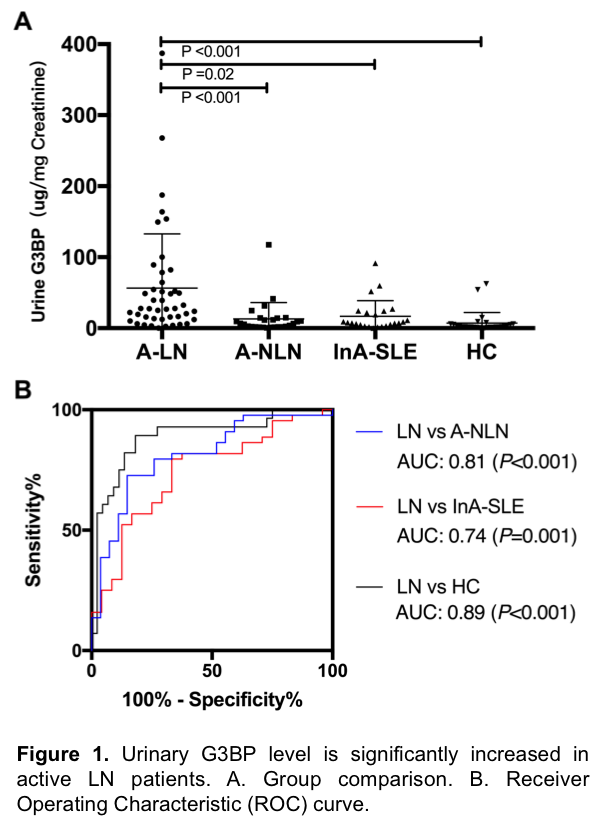Session Information
Date: Sunday, October 21, 2018
Title: Systemic Lupus Erythematosus – Clinical Poster I: Clinical Manifestations and Comorbidity
Session Type: ACR Poster Session A
Session Time: 9:00AM-11:00AM
Background/Purpose: Lupus nephritis (LN) is one of the most common and severe manifestations of systemic lupus erythematosus (SLE). This study investigates urinary galecting-3 binding protein (G3BP) levels in LN patients and their association with renal disease activity both clinically and pathologically.
Methods: A total of 44 biopsy-proven active LN, 27 active non-nephritis SLE and 24 inactive SLE patients were recruited. All of them fulfilled the 1997 ACR classification criteria for SLE. 28 Age matched healthy controls were recruited. Urinary G3BP was tested by ELISA. rSLEDAI was the total score of the four kidney-related parameters in SLEDAI.
Results: Urinary G3BP levels were significantly increased in active LN patients, and discriminated LN patients (27.65 (12.68-62.04)) from active non-nephritis SLE (6.35 (1.84-14.25), Area Under the Curve (AUC): 0.81 (P<0.001)), inactive SLE (7.62 (3.58-23.57), AUC: 0.74 (P=0.001)), and healthy controls (1.89 (1.31-5.54), AUC: 0.89 (P<0.001)) (Tab.1 and Fig. 1). Urinary G3BP performed better in discriminating active LN from active non-LN nephritis SLE than conventional markers, such as C3 (AUC: 0.51), C4 (AUC: 0.59), and anti-dsDNA (AUC: 0.51). Correlation analysis showed a significant negative correlation between urine G3BP and hemoglobin (r=-0.29,P=0.005), positive correlation between urine G3BP and 24-hour urine protein (r=0.46, P<0.001), anti-dsDNA antibodies (r=0.26, P=0.02) and anti-nucleosome antibodies (r=0.43, P<0.001) (Fig.2A-2D). Moreover, renal disease activity as assessed by rSLEDAI correlated with urine G3BP levels (r=0.41, P<0.001) (Fig. 2E). In 44 biopsy-proven active LN patients, urine was collected one day before the biopsy day. These precious concurrent samples revealed urinary G3BP levels were significantly elevated in Class III and Class IV LN over Class V LN (32.59 (15.75-80.46) vs 4.54 (3.83-19.09)). More importantly, urinary G3BP correlated with pathological renal activity index (AI), suggesting the measurement of G3BP levels in urine is useful in monitoring the progression of renal pathologies in patients with LN (Fig. 2G-H).
Conclusion: Our data suggest urinary G3BP as a biomarker for renal pathologies in patients with LN. These findings should be confirmed in a larger cohort to further validate the utility of urinary G3BP as a biomarker.

To cite this abstract in AMA style:
Ding H, Ling C, Bassi R, Okitsu SL, DeMartino JA, Shen N. Urinary Galectin-3 Binding Protein As a Novel Biomarker of Renal Disease Activity in Lupus Nephritis [abstract]. Arthritis Rheumatol. 2018; 70 (suppl 9). https://acrabstracts.org/abstract/urinary-galectin-3-binding-protein-as-a-novel-biomarker-of-renal-disease-activity-in-lupus-nephritis/. Accessed .« Back to 2018 ACR/ARHP Annual Meeting
ACR Meeting Abstracts - https://acrabstracts.org/abstract/urinary-galectin-3-binding-protein-as-a-novel-biomarker-of-renal-disease-activity-in-lupus-nephritis/
